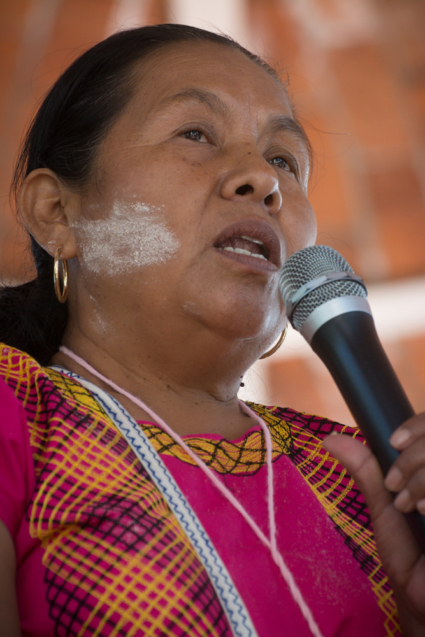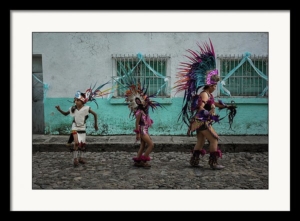Marichuy Patricio Martínez, Mexico’s First Indigenous Woman to Run for President, Visits Mezcala, Jalisco
She came to collect signatures to get her on the 2018 ballot and address the local epidemic of kidney failure, the second-highest in the world.
Maria de Jesús Patricio Martínez is the first indigenous woman to attempt to run for Mexico’s highest office. Marichuy (Chuy is the nickname for Jesús) was nominated in May by the National Indigenous Congress (CNI) to represent Mexico’s indigenous people in the 2018 presidential elections.
To even be on the ballot, however, she has until February 1 to obtain 870,000 signatures — no easy task for a campaign without the multi-million dollar funds and connections of Mexico’s long-established political parties. Two months in, she has so far received 90,000 signatures.
With six weeks to go, it will likely be impossible to collect the remaining 780,000. Her mostly symbolic campaign is meant to bring awareness to the plight of Mexico’s indigenous, who make up 22% of the population.
About 100 people attended Marichuy’s visit to collect signatures in Mezcala, an indigenous pueblo 90 minutes southeast of Guadalajara, Mexico’s second-largest city. Mezcala lies to the west of Agua Caliente and San Pedro Itzicán, which has the second-highest epidemic of kidney disease in the world.
I’ve translated her speech, below, from the original Spanish.
Good afternoon, brothers and sisters of this community of Mezcala. Thank you for this lovely reception and the media who accompany us.
I want to tell you that this proposal arises just like you have spoken here, all your pains, all that is destroying this community. We have walked the south of this country, we have walked through a number of states, a number of communities, a number of indigenous villages, and all the problems that you have brought up are in relation to the plundering of the land, to the contamination of the water, to the trees that they are cutting down and destroying, to the water that they are monopolizing for a few, to the schemes that they are putting in the communities without the consent of the community. The fear that they are instilling through organized crime, and above all before the organizational intents of the different communities, the repression that you have had, the imprisonment, the death, the disappearances; and hearing here what you also have been suffering as a community, this is something that is happening in all the indigenous villages.
And who is it benefiting this dispossession of the riches that these communities have? The capitalist system wants it. Those who have money and are getting in our way want it.
And what do they do to get us out of this land? They make us fight between ourselves, they deceive us, bribe us and we fall.
You have expressed here the situation about the youth and it is happening in other places, and it’s for this purpose: so that the young people become alienated and don’t think, and leave that independence so that those from outside come and rob these communities. It’s something that is going on everywhere. On this journey that we’ve taken, we’ve heard from the women, the men, the youth, everyone has spoken and they’ve said what it is that bothers them, what it is that pains them, how they have been organizing, and in some places they say, “We’re not going to stand here. Despite what we are suffering, despite that they jail us, despite that they kill us, we’ll continue fighting for our land.”

Therefore, that’s why our proposal on this tour speaks to the root of what our towns are suffering, they are emptying out, they are taking away their wealth. And what we’re saying is that it’s necessary to organize ourselves, it’s necessary to join hands with everyone before this dispossession that is happening to our communities. We have to flourish our communities, we have to begin to see how they are taking away our communities and how we need to organize ourselves from the inside, from below.
And we have to grow like these little plants that are here and that grow from down below to above, and that these plants grow without infestation and grow strong and flower. This is how our communities have to be. This is how our towns need to be.
Only we from these communities, from wherever we are, we have to begin to talk to each other. We have to begin together to analyze what we are going to do to not allow them to strip away our communities. To stop them from taking our wealth that our ancestors left us, that right now we’re protecting and that we’re going to leave to those who come after. And if we knew to conserve our land, and if we knew how to save our trees, and if we knew know how to take care of our water, there will be life for everyone, not only for the community of Mezcala but for everyone around.
Therefore, this is a proposal, a call that rises from the pueblos that have been for more than 20 years in the National Indigenous Congress. This is what makes us go forward to participate in this 2018 electoral process: to shed light on the problems which these communities have, which they see, which they hear. To know that it’s not true that these communities are now better, that they no longer have problems.
Here, right now, we’re hearing the problems that they have and they are hard. So, it’s about announcing these problems but also, upon traveling, upon getting to know the communities and what they have to say, this is how we are going to make ourselves strong. How are we going to shake hands among communities?
So that’s why our proposal is anti-capitalist, because what capital wants is to rob us of these riches, to make us fight and brush us away. What it wants is for us to disappear so they are exempt and can do with the land whatever those who give them money want. And that’s why our proposal is that call that we have to organize ourselves. It’s the only alternative in the face of this process of destruction.
If we don’t organize ourselves from below, the best is still up there. There will not be a change. The change will be down here from our communities. We have to join together and make ourselves strong and draw strength despite the destruction that this capitalist system is leaving. From between these ruins, there is still hope and the hope is organization.
If we manage to organize ourselves, we’ll do much for our community and for more communities. And if we go marching, not only indigenous villages but brothers that are in the city, who are also feeling affected, it will be something different for Mexico.
So our proposal is that we have to reconstruct this Mexico from underneath and so they’re not just indigenous villages, they’re also brothers who also live in the city: workers, teachers, doctors, nurses, everyone. We have to search for the way to reconstruct Mexico from below. This is our proposal, this is our task. As they will see, we don’t bring anything to give them. We bring the word and we bring work, it’s the only thing that is going to help us to be able to counteract this system that is ending our communities.
And if our communities end, if the water ends, if the earth ends and if the trees end, we will end together with them. That’s why our proposal is the one we’ve brought to you, that we have to organize, not here for 2018. We have to organize to be strong beyond 2018, because that’s when the development of these megaprojects is coming with even more force, to rob our lands and territories.
So it’s a huge task that we have, the indigenous villages. It’s the word that they commanded us to bring, and so we’re traveling to different communities in Mexico, as well as to our brothers that are in the city.
And so brothers and sisters, this is our word and we keep going on.


